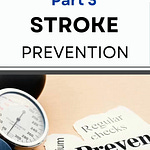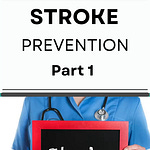Hi, I'm Dr. Jason Siegel, and welcome to Neuro in the News, where we review three of the most searched and read neurology stories over the past week, according to ChatGPT and Google.
The three stories are,
Artificial intelligent model measures brain aging to detect cognitive decline
Poor sleep alters immune cells, increasing inflammatory disease risk
Low normal vitamin B12 is linked to slower brain processing
AI Detects Brain Aging
Age is a really interesting thing. We often think of age in terms of how many days or weeks, months, years we've been on the planet, but if you have two people of the same chronological age, do their organs, their heart, their lungs, their brain age at the same rate?
What if we could measure how fast your brain is aging, just like checking your biological age?
Researchers have developed an artificial intelligence model that tries to do exactly that.
A study published in Nature Aging describes an AI-powered tool that analyzes MRI scans to assess how different regions of the brain change over time. The model compares these changes to a reference database to determine whether someone's brain is aging faster or slower than expected.
This could be a game changer in early detection of conditions like Alzheimer's andother neurodegenerative diseases. Researchers found that accelerated brain aging correlated with cognitive decline, reinforcing the importance of early detection and intervention. The study suggests that monitoring brain aging may help predict future neurological disorders.
As I've talked about in other videos, diseases like Alzheimer's are not diseases of late age. They're actually diseases of middle age. The things that people do in their 30s, 40s, and 50s have a massive consequence on how their brain ages and the development of neurodegenerative diseases like Alzheimer's, Parkinson's, and vascular dementia.
Having the ability to accurately predict at a much younger age how fast someone's brain is aging compared to their peersand can allow us to tie that accelerated brain aging to modifiable risk factors, and perhaps we can slow down that aging brain and prevent neurodegenerative diseases down the road.
So what's next? Well, AI models like this could become routine in clinical practice, helping. Doctors and neurologists personalize treatments for patients at risk of cognitive decline.
Poor Sleep and the Immune System
It sems like every week there's a new story about sleep. Sleep is something we all take for granted until we can't do it and we have insomnia or we're sleeping too much.
We've all experienced bad night's sleep. The next morning we're groggy, we're less sharp throughout the day. But having even one poor night's sleep can actually have a consequence on the rest of our body.
New research shows that even one night of sleep deprivation can rewire your immune system and not in a good way. A study published in the Journal of Immunology found that sleep deprivation increases levels of non-classical monocytes, immune cells linked to chronic inflammation. This pattern is also seen in obesity, diabetes, and cardiovascular disease. So in other words, skipping sleep puts your body into an inflammatory state similar to what we see in these chronic metabolic diseases. Over time, chronic sleep loss may contribute to conditions like Alzheimer's, stroke, autoimmune disorders, and that's because inflammation affects the brain and the heart, in ways we're only beginning to understand.
So what can you do? Obviously prioritize sleep. Avoid screens before bed, maintain a consistent sleep schedule, and limit caffeine and other stimulants in the afternoon. These are elements of something we call sleep hygiene. If you find that despite this, you're still having difficulty falling or staying asleep, talk to your doctor, talk to a neurologist or a sleep specialist. There's a lot of non-medication, non-pharmacological ways to enhance our sleep quality. Reach out to your health care providers for more information.
Low-Normal B12, Cognitive Slowing, and White Matter Disease
Supplements come up a lot in practice. Patients want to talk about what they see in the news and out there in social media. It’s very very common for primary care physicians, neurologists, and other providers to check Vitamin B12 levels in patients. The “normal” range of B12 is wide, and generally speaking, if somebody is within the normal range of B12, we don't get too worried about it. But it does bring up the question of what is normal for one person may or may not be normal for another person.
New research suggests that even “low-normal levels of B12” could slow your brain's processing speed. A study published in the Annals of Neurology found that older adults with lower, but still technically normal levels of active vitamin B12, had slower cognitive processing and more white matter lesions in the brain.
White matter lesions is a topic that keeps coming up over and over again. This is important because white matter consists of the long wires of the brain. They're called axons and they connect computers over long distances of the brain and spinal cord. Axons help the neurons, the brain cells, communicate, and when they're damaged, thinking can slow down and memory can be poor.
The researchers suggest that current guidelines for vitamin B12 may need to be updated. Right now, the lower limit of normal may not actually be good enough for optimal brain health.
I think it's a little too early to be making blanket statements saying everybody needs to be on B12 supplementation or that everybody needs to be on super max doses of B12. We know it's a water-soluble vitamin that if you have too much of it, you probably will just excrete it in your urine- You'll just pee it out.
I see a lot of people on B12 with very high blood levels of B12 who still have brain fog and fatigue, so it's not going to be a cure-all for those types of symptoms. But if you're experiencing brain fog, fatigue, or memory issues, ask your doctor about checking your B12 levels. There are other metabolites we can check to see not only if the B12 level is itself is where it's supposed to be, but is it functionally doing what it's supposed to be doing.
And you might be thinking, “Well, who knows what my level is, I'm just going to go to the store, get a bottle of B-complex vitamins off the shelf. I’ll just take that. I'll be fine.” That may be true, but supplementations are not a well-regulated industry. You don't quite always know what you're getting in these tablets. I would recommend if you're going to go to the store for supplements off the shelf that you check and see if they've been validated by an independent lab; another place that has checked these supplements make sure that the quality and the consistency and what they're advertising is in the pills is actually accurate.
I hope you enjoyed this week's episode. I'll try to do this on a weekly basis, reviewing the three most searched for and read neurology topics in the previous week. You can also check us out at our other social media outlets. We're on Instagram, TikTok, X, Twitter. @YourNeuroNow
Please subscribe to this channel. Leave comments and feedback. Let me know what you want to hear more of hear less of. I want this to be helpful and educational for you and I’ll see you next week.










Share this post